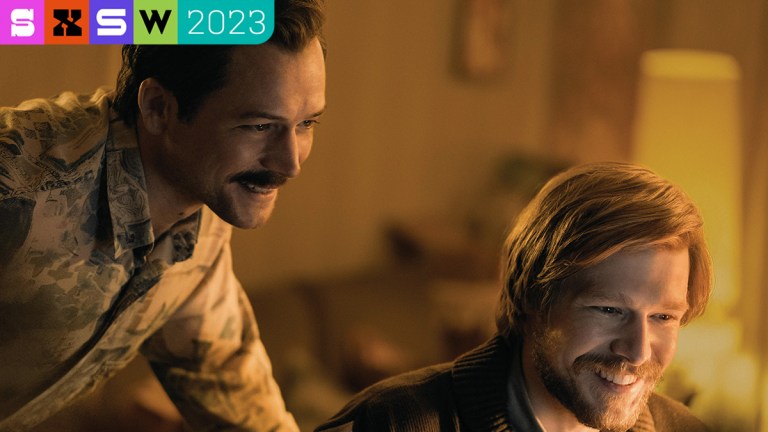Tetris Is Definitely Not the Video Game Movie You’re Expecting
Exclusive: Tetris director Jon S. Baird takes us behind the Iron Curtain and into one of gaming’s greatest revolutions.

Jon S. Baird has just closed Twitter. The trailer for Tetris was released an hour ago, and the director’s been watching the online reaction closely ever since. There’s one joke that everyone seems to be making—where are the talking tetriminos?
“It’s absolutely not that at all,” the Scottish filmmaker tells Den of Geek with a laugh. “I hear that a lot, but I like that people are noticing that it’s a bit different.”
Tetris is certainly a different proposition from other video game movies. Rather than being about falling blocks that need to neatly fit into lines, Tetris tells the story of Henk Rogers, the mustachioed man who secured the rights to distribute the eponymous game around the world. While that doesn’t exactly sound like the plot of a fun thriller at first glance, the fight to get Tetris on the Game Boy took Rogers into the heart of communist Russia, where the Soviet Union ruled and the Iron Curtain was up. Making things more difficult was the fact that two other suitors were hoping to take control of Tetris—and they had more money and better connections than Rogers.
“I’m probably less of a gamer and more of a thriller person,” Baird admits. “For me, it’s a thriller—it’s a mad story—that just happens to be about one of the most famous games there’s ever been.”
Before you start worrying about a non-gamer being trusted with such an important story in the medium’s history, Baird wants to stress that although you won’t find him spending Sunday afternoons with a PlayStation controller in hand, he’s certainly not “anti-gamer.”
“I don’t want to lie and bullshit because I wasn’t a gamer, but I did play Tetris,” he says. “I wasn’t very good at the beginning, but honest, I’m pretty wicked at it now. I had to go into training for it because I didn’t want to meet Henk and Alexey and be shit at it, you know?”
The Alexey he refers to is Alexey Pajitnov, the creator of Tetris, who struck up a friendship with Rogers over their shared love of games. Both Rogers and Pajitnov helped with the movie’s development and brought an extra dimension of realism to the story. “I’m a great believer in detail,” Baird says. “We got the guy who actually invented Tetris to write the code we use in the movie. With Henk, it was about details like, ‘What were the border guards like? What was your hotel room like? How gray was Moscow?’”
Baird himself brings some high-profile filmmaking credentials with him, having previously directed the brilliant black comedy Filth and the BAFTA-nominated Stan & Ollie, and it’s impressive what he’s achieved with Tetris. Although there are a few scenes of people using legal jargon in cold Russian offices, Tetris flies when Rogers is pulling sly tricks on the KGB to make sure he’s the person who lands the rights of the game. Oh, and there’s also a bombastic car chase toward the end.
“Henk sees himself as a bit of a movie star anyway,” Baird says. “He’s got that really lovable rogue thing about him. The more stuff like [the car chase], the better for Henk. But I have to say, 90 percent of it, we really stuck to the [real] narrative. We just jazzed up the other 10 percent because it’s not a documentary.”
The movie is also propelled by Kingsman and Rocketman’s Taron Egerton, who gives Rogers a likable, approachable charisma and pathos. “I actually think that this is his best performance,” says Baird, who originally intended to collaborate with Egerton on a different project before turning his attention to Tetris. “That may sound conceited, but I think he’s done something here that’s more subtle and grounded and really shows another aspect of how much acting chops he has.”
What’s more impressive is that those subtleties come through even when Rogers has a mustache that would give Mario a run for his money. “He hated that thing!” Baird laughs. “At the end of every day, he’d rip it off, and he told me he would never, ever do a film where he had to wear a mustache again.”
Another aspect that makes Tetris such great fun is the way Baird uses assets from the gaming world. One early scene sees Rogers trying to get a bank loan to purchase the rights to Tetris in Japan, and as he talks, those famous colorful tetriminos fall from the ceiling. A few moments later, Hiroshi Yamauchi, the third president of Nintendo, makes an appearance, as does Howard Lincoln, the former chairman of Nintendo America, who reveals to Rogers a top-secret new project: the Game Boy. And, of course, that famous, catchy Tetris music is used throughout.
“It was hinted at in the script, using ‘Player One’ and ‘Player Two,’” says Baird, “but it wasn’t really until post that we really started playing with [Tetris assets]. At one stage, there was far too much of it, and it just felt gimmicky. We tried putting a lot in, then we took too much out, and then we took it out and didn’t have enough. We leveled up.”
Filming primarily took place in Aberdeen, and many of the establishing shots are stylized like classic eight-bit games. “We needed that because we couldn’t go to Moscow and shoot or Tokyo or Seattle,” Baird says. “It didn’t feel jarring, and it looked as though we meant it, which we didn’t really. The visual effects guys were top-notch on this, and the whole car chase is a visual effects thing. None of it’s practical. I haven’t done much of that, but it turned out well.”
With Moscow and the Soviet Union playing such a central role in Tetris, the movie—set in the late ‘80s—has become surprisingly relevant to the modern-day climate.
“In a strange way, it has become so relevant because of this horrendous situation in Ukraine,” Baird says, referring to Russia’s ongoing invasion of the country. “For people who were around at the time, it reminds them of how scary it was, and for younger people who weren’t around them, it educates them about how scary it was and how scary it is now. For Henk to make a decision to put himself in Moscow back then, it was terrifying. People appreciate it more now because I wouldn’t fancy going to Moscow at this time to try and do something like that. It’d be a frightening prospect. It would have made it a lot more difficult for me, personally, to make this had the war been going on at the time [we started].”
With those political aspects in mind, Baird says they were originally shooting for a movie that felt like The Social Network and Bridge of Spies. “I don’t think the film has ended up as any of those,” he says. “It’s its own thing, which I’m really proud of. I don’t know how you describe this movie; I’ve got no idea, which is maybe a good thing.”
Like the game, Tetris is a unique proposition—and maybe it, too, will prove a real blockbuster.
Tetris premieres at SXSW 2023 on March 15. The movie hits Apple TV+ on March 31.
